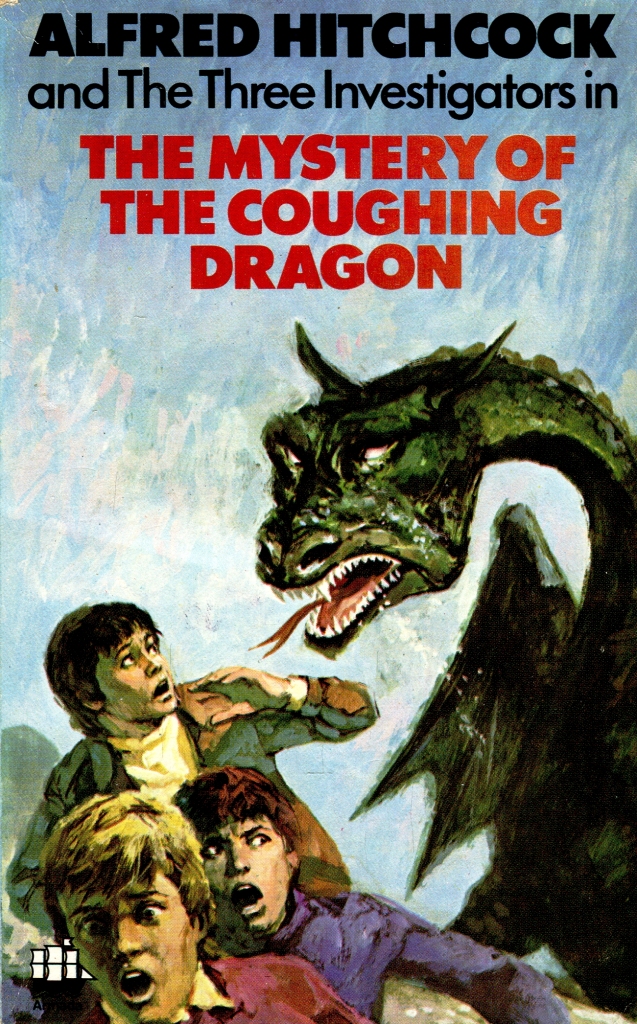It’s been ten months since I last caught up with Jupiter Jones, Pete Crenshaw, and Bob Andrews, so how does new author Nick West — a nom de plume of Kin Platt — apply himself here, in the first of his two entries in The Three Investigators series?
Like all good P.I. novels, this begins with an unpromising setup that you know is going to lead onto bigger things: five dogs have gone missing from the town of Seaside, giving rise to perhaps the darkest joke in the series to date:
“There’s this master criminal loose with this mad plan of getting control of the doggie market. Maybe he intends knocking down the price of hamburger meat, in addition to selling the stolen dogs at a handsome profit.”
When Alfred Hitchcock himself phones and asks the boys to find one of these dogs, owned by his good friend and old-timey horror director H.H. Allen, there’s also the small matter of, well…
“My friend’s house overlooks the ocean, and there are caves running beneath it. The night that his dog disappeared, my friend insists he saw a rather large dragon emerge from the ocean and enter one of the caves underneath his dwelling.”
There was a stunned silence.
“Well, what do you say, my boy? Are you and your companions willing to try to unravel this mystery?”
The invoking of mythical creatures is a new one for the series, I’ll give West that, and Jupe is quick to dismiss the sighting on the basis that, y’know, dragons don’t exist, but the conceit itself isn’t quite compelling enough to justify the thin plot that emerges. The unlikely mysteries featured in this series — whispering mummies, ghosts, skulls that talk — have always been interesting because of the possibilities they raise, whereas this feels too big to have anything other than one outcome. Spoilers, I guess, but anyone who’d seen Dr. No (1962) would know exactly where this is going, and it’s a great example of why a Huge Mystery doesn’t necessarily make an interesting mystery.
In short, West never really convinces as someone who feels comfortable writing for the intended audience. He’s to be commended for avoiding the no doubt strong urge to bloviate and over-explain everything, and in that regard sticks to the brief laid down by Robert Arthur when creating the series, but this alone isn’t enough. West’s plot progresses slowly, with obvious developments treated like the most amazing thing ever, and plot-driving occurrences that require seemingly impossible levels of technical know-how are brushed aside as if barely any trouble at all. West, it seems, wants you to be amazed when he does that ‘removing the top of your thumb’ trick and yet ask no questions when he actually makes the Eiffel Tower disappear.

His choice of language isn’t exactly fitting, either — one character says something in a “sepulchral voice”, sending youngsters the world over clamouring for their dictionaries — and the casual mention of a historical figure having lost his mind, fortune, and reputation and so resorting to suicide saw me reading the sentence in question about four times because of how out of left field it comes. Additionally, the comedy of errors that marks the denouement requires previously capable and intelligent men who have managed an engineering feat that would cause headaches to a whole crew of people 50 years later to turn into the Three Stooges because of the appearance of…well.
West’s book is certainly never boring, since every time we run into a dead end there’s a sinkhole or a magic revolving rock door to push us on, but the level of surprise and intrigue generated elsewhere in the series is sorely lacking. There’s a good level of banter among our central trio — “How come he always outvotes us, one to two?” Pete says of Jupe when the latter dismisses their concerns and forges ahead with his investigating anyway — but it says something that I reckon the best joke in the entire thing — the boys sitting “spellbound” as they watch one of H.H. Allen’s creature features — was undoubtedly made by accident.
Any book that ends with a group of dogs gambolling joyfully along a stretch of beach can’t be all bad, but the small cast never affords anything close to a mystery about the malefactors, the eponymous dragon wouldn’t convince anyone for more than a second’s glance, and the means by which the dogs come to be involved with the scheme and so go missing is baffling to me — surely you could get by without…that thing which caused that to happen. I understand West’s desire to take a small mystery and turn it into the means by which greater crimes are uncovered, but it just makes no sense to me, and results in what I’m going to call the weakest of the fourteen books I’ve read so far in the series.

West would go on to write only one more book for this series, sixteenth entry The Mystery of the Nervous Lion (1971), and on this evidence it’s difficult to lament the brevity of his contribution too greatly. He appears to have had a successful writing career elsewhere, and all opinions of this nature are subjective and so you’re of course welcome to have found this one charming and wonderful, but for me it’s hoary and convoluted, and elicits nothing more than a weary sigh and the hope that I’ll have more to say at my next encounter with these three.
~
Three Investigators reviews can be found here.

Even reading this as a kid it was just wildly implausible to me. It does move really well, which helps a bit to hide just how nuts it is.
LikeLike
Yes, well said. Propulsion is often a good way to hide improbability, and West is propulsive at times…even if, in being so, he breezes pat all manner of questions that really need to be answered first!
LikeLike
Jim, I look forward to your review of volume 15 (Flaming Footprints), as it is one of the few entries in this series where the development of the story is preserved for posterity in a series of letters between the author and the editor at Random House:
https://www.threeinvestigatorsbooks.com/MV_Carey_Random_House_Letters.html
LikeLiked by 1 person
Thanks, Ian; I’ll leave off reading these until after I’ve read the book — not for fear of spoilers, more because I imagine they’ll make more sense then — but can well believe that this offers an excellent window on the process.
Looking forward to starting Carey, too. The fact that she stuck with the series for so long bodes well.
LikeLike
Also, Jim: do compare the first page of this effort with the opening scene in Vanishing Treasure: you’ll get an insight of sorts into the pressure Platt laboured under in order to get this story finished in time. It’s essentially sanctioned in-house plagiarism.
LikeLike
Oh, wow, I see what you mean. It might — charitably — have been Platt getting his eye in by using on Arthurian conceit as a jumping off point, to help ground his debut effort in the spirit of their creator. It might not, but I’m willing to give him the benefit of the doubt; the guy only wrote two novels in the series, so clearly wasn’t comfortable in the milieu.
LikeLike
Thanks for posting the link to those letters! I always liked Flaming Footprints so a look behind the scenes is really interesting.
LikeLike